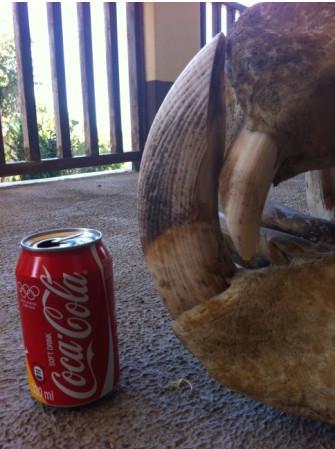We had a long commute from Zulu Lodge to Kosi Bay Lodge. Our driver picked us up at 10AM as we had 6 hours ahead of us. North and west we needed to drive to but a few miles from the Mozambique border. These lengthy drives are not usual for me or my customers but given this trip was being hosted on our behalf, I was only too pleased to be driven the 6 hour journey.
The manager of Kosi Bay Forest Lodge, Bruce, met us at the entrance to the iSimangalisa Wetland Park where the lodge sits. The journey to the lodge was but a few minutes and immediately we noticed the tidiness of the local African housing. Bruce noted to us that the Thonga people inhabit this area and are proud of their appearance and houses, It well shows as their accommodation, while simple, was well kept and void of trash or debris. The yards were neatly trimmed by hand.
The assistant camp manager, Blessing (or Samasisu in Thonga) is a local who has worked his way up from day laborer to assistant manager. His house was painted a dark yellow color and was filled with some youngsters scurrying about. The lawn too was closely cropped. Bruce pointed out to us that Blessing began building his house 8 years ago, making the concrete blocks himself. The house now has six bedrooms and is due to have another 3 added. Blessing only adds a room when he has the money to pay for it.
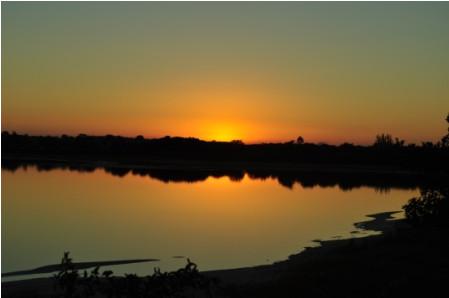
Kosi Bay is set on a lake which is part of a 4 lake estuary system being fed by a small river. The 4 lakes vary in salinity with the last two lakes being salt free. There are no plains game nor Big 5 animals in this park but the area is well situated to support such. There are plans in the future to introduce these animals (at least the non predators). For now, the lodge is set in the woods surrounding the lake and the experience offers more of a relaxed setting to enjoy kayaking, boating, birding and hiking.
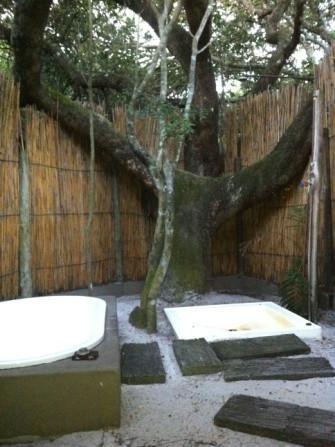
A highlight of this lodge may well be the outdoor bathroom. Each room is equipped with an outdoor shower and sunken 2 person bathtub set under the tree canopy. These type bathrooms have continued to be a mainstay in my continued enjoyment of the African bush experience. This facility ranked right up at the top of the heap. As we were a bit late to get out on the boat and onto the lakes, I settled in for a long, hot bath in a bathtub fit for the Victorian era. Lit by kerosene lantern, the whole experience in the outdoor shower area was well spent in a lengthy manner.
Blessing himself is a physically imposing person. His height and girth were only matched by his personality. Impressive that he started with this lodge 16 years ago, has risen to his current position and is the primary breadwinner for a household with multiple generations.
In the morning, Craig, Peter and I met Blessing in the lobby and headed out to visit the lake system. We were instructed that en route to the boat we would pass through 3 distinct ecosystems, all easily discernible to the naked eye. Bruce and Blessing were correct in their description of the geography we walked in but 10 minutes down to the water’s edge. We started in sand forest which is quite similar to the low lying trees and cover we might find on the east coast. We were walking on sand.
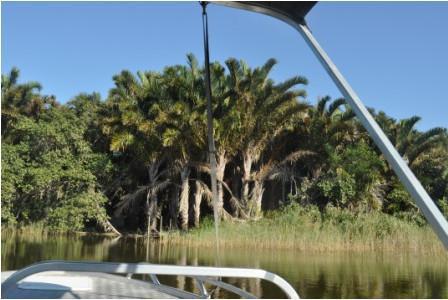
After about 100 yards this vegetation gave way to the swamp forest where the trees were much taller, 100 feet or so, the sand gave way to browner soil and larger pieces of tree bark, etc. in the footpath. This delineation was so strong I could have drawn a line in the sand. Lush, green knee high jungle like vegetation surrounded us. Yet another 100 yards and down to the lake’s edge the final stage of the ecosystem change was called a raffa forest. Palm trees stretching over 100 feet stretched above us and the ground below was even darker still and laced with the fallen palm fronds. These palms have the largest leaves in the world as the fronds sometimes measure up to 30 feet in length.
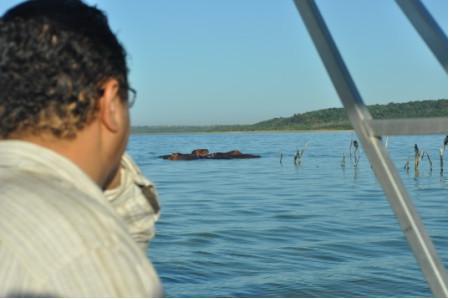
Blessing took us out across the fourth lake, with the intention of reaching the third and second lake, tides permitting. The third lake was dead calm and quite large. Sand dunes stretching 100 feet tall protected the opposite end of the lake from the wind coming off the Indian Ocean just on the other side. The water was clear and the breeze from the boat just right for the early am trip. After about 10 minutes crossing the lake we headed up stream through a narrow waterway but about 20 feet wide which connected the lake systems. The pathway was lined with reeds and served as the means by which for hippo to travel from lake to lake by day so we needed to be a bit careful.
Opening up to the third lake, Blessing took us over to the far end where he shared with us the fishing traps laid out before us that the Thonga people have used for hundreds of years. Taking advantage of the tidal aspect of these lakes and the fact that the local fish come from the ocean here to spawn, the Thonga people have developed wooden traps with which to fish. Fishing poles have given way to a simple, yet extensive, series of waterways the fish travel after spawning and beginning their trip back to the sea. Careful attention has been made to only trap the fish which have finished the reproduction process and are returning to sea.
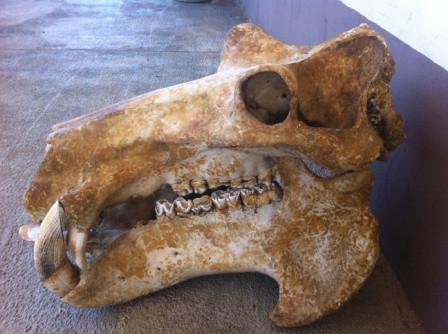
The lake bottom at 6 feet could be easily seen through the clear water. Due to the tide being low at the time we could not extend our trip up through to the second lake but returned through the waterway and into the first lake. Blessing had to return the bag of a local fisherman from whom he had purchased a salmon the day prior. We eased the boat onto the shore as the fisherman came to retrieve his bag. Price of the 10 pound salmon was 100 Rand or about $15. Pretty good price of $1.50 a pound for such a quality fish. Turns out the man fished as a spearhunter. He stayed by the water’s edge and when the tide rose he would spear what was available. A ten pound salmon at the water’s edge sounds like a good time (if the hippos are kept on the other side of the lake).
After our morning boat ride the camp manager, Bruce, drove us through the reserve on the back roads for about an hour where we were then met by Maxwell who drove us on through to Isibindi’s Thonga Beach Lodge.
